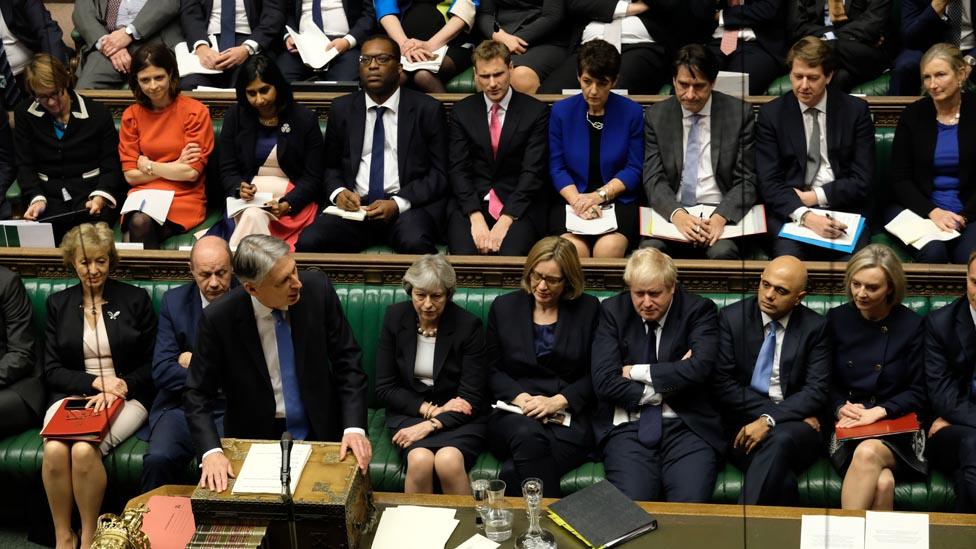Fiscal Phil's Budget - is it just about the cash?
- Published
- comments

Philip Hammond delivers his Budget, watched by Conservative MPs
I don't know about you but I'm still swimming in statistics.
The Budget throws up more than enough to last a lifetime. And when there's not much money around, politicians tend to combine annual increases to give a number with more zeros. It doesn't always add to the sum of human understanding.
Disraeli had a phrase for it. But then, in the post-devolution age, there are statistics that apply UK-wide, numbers that apply only in Wales and other figures that apply in Wales, England and Northern Ireland (but only for a few months). No wonder so many members of the studio audience on Wednesday's Wales Live seemed confused, often conflating UK and Welsh numbers.
The UK government announced £1.2bn for the Welsh Government. But as we know, the extra money is over four years - during which ministers in Cardiff will spend more than £60bn.
Most of the money has strings attached (the SNP Scottish government says it's a con). It comes in the form of "financial transactions" so can only be used in certain ways.
Welsh Finance Secretary Mark Drakeford told my colleague Nick Servini: "Just remember. Over half of that is money we have got to give back to the figures are not quite what they seem on the surface."
'Sting in tail'
He added, via Twitter: "A sting in the tail - majority of additional capital funding for Wales must be repaid to UK Treasury."
Is he right? Welsh Secretary Alun Cairns told me: "That isn't right. This is a means that we've used over the last five years because it forces the Welsh Government to invest in business, to invest in infrastructure, to invest in projects. They've said themselves that they want to move away from grants and to offer loan type structures to businesses.
"Well provided they go on re-investing to ensure that businesses and communities benefit then everyone is going to win out of this package."
It's been a crash course in government finance for some of us. My man with the spreadsheet suggests that some of the money could be handed to housing associations to build homes. They gradually repay the Welsh Government, which then finds its share of UK government spending correspondingly adjusted.
'The money'
So perhaps they're both right: it's added spending power, but from Cardiff's point of view the wrong kind of money.
But is it just about the money? Professor Drakeford, who also has to decide whether to follow Philip Hammond and adopt Ed Miliband's stamp duty policy, external, published several tweets, external highlighting higher public spending in Wales. "Continuing to protect spending on education in Wales," he said. "It's 3% higher than in England."
On the NHS: "Spending on health and social care 8% higher in Wales than in England."
And on homes: "We're already prioritising funding for housing: £1.4 billion to build 20,000 new homes. The Chancellor is following where @welshgovernment leads."
That may sound very re-assuring if you live in Wales. But it also raises questions about the outcomes delivered by that higher spending.